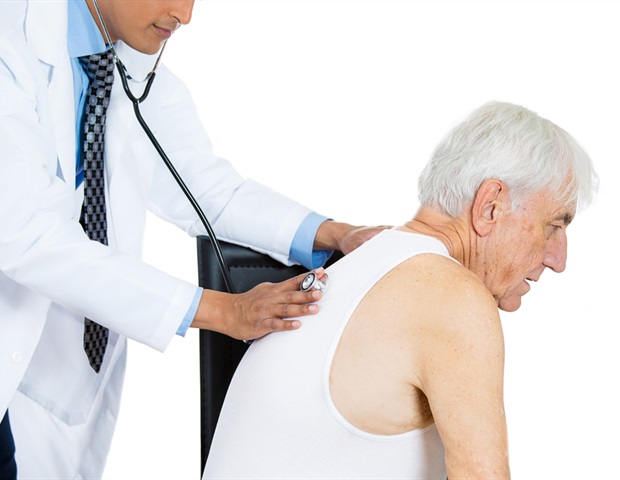More people die from pneumonia in the UK than anywhere else in Europe, according to new analysis by leading lung charity, Asthma + Lung UK. Now, the charity is raising awareness of the signs and symptoms of pneumonia, and urging people who are eligible, such as those with severe asthma, pulmonary fibrosis and COPD, to get their one-off pneumonia vaccine.
With the NHS already braced for one of the toughest winters in its history, as the triple threat of COVID-19, flu and pneumonia looms, Asthma + Lung UK is also calling on the UK government to prioritise respiratory services and ensure they remain a long-term focus for the NHS.
The charity’s analysis has revealed that each year more than 25,000 people die from pneumonia in the UK. The UK also has the third highest death rate from pneumonia in Europe. While it is particularly risky for older people and those with existing lung conditions, Asthma + Lung UK is warning the condition can be life-threatening at any age.
Pneumonia is a type of chest infection and a leading cause of emergency hospital admissions every winter, placing significant pressures on the NHS. Symptoms can include a cough, difficulty breathing, a high temperature, chest pain and loss of appetite.
The condition, usually caused by a bacterial infection or a virus such as flu, leads to one or both lungs to swell or become inflamed. While mild pneumonia can be treated with medication at home, in some cases, pneumonia can be life-threatening and require hospital treatment.
In the UK there are many people with pre-existing lung conditions who do not receive the support they need to manage their condition and stay well. Asthma + Lung UK says this could be contributing to the high death rates.
The charity says this data is another example of the nation’s poor lung health and the vital need for more investment into respiratory research to find better treatments for people with lung conditions. Lung conditions are the third biggest killer in the UK, but only receive 2% of public investment into research that would help diagnose, treat and manage them much more effectively.
Health experts say the pneumonia vaccine can reduce the likelihood of getting pneumonia by 50-70%, dramatically reducing the likelihood of serious illness and death.
Those who are eligible for a free pneumonia vaccine from the NHS include:
- Adults aged 65 years or older
- Children and adults with certain long-term health conditions such as COPD, pulmonary fibrosis and severe asthma
- Adults at an occupational risk such as metal workers and welders
- Babies as part of their usual vaccination schedule.
Jardine Howlett, 39, a public relations manager from West Sussex, had pneumonia in 2017, which left her in a coma and hospitalised for months, she says:
“I went to bed feeling unwell the night before my son’s birthday and awoke in the middle of the night gasping for breath. It was absolutely terrifying. I called 999 and there wasn’t time to kiss or hug my boys’ goodbye as I was rushed to hospital with lung failure, coughing up blood in the back of the ambulance. Within minutes of arriving at hospital I was hooked up to antibiotics, transferred to the ICU and put in an induced coma. It turned out I had pneumonia, caused by a bacterial infection.
“I didn’t return home for almost 3 months. I was lucky to return home at all. You think of pneumonia as something that only affects older people, but it can affect anyone, at any age and trigger rapid life-threatening complications.
“Whilst I was lucky and able to get back to most activities within a matter of months, there were side effects, such as breathlessness, fatigue and brain fog, which lingered, and my lungs are still my weak spot. If I’m ever feeling tired or if I’m pushing myself too hard, there’s a slight pain in my chest, reminding me to take it easy – I appreciate the reminder.
“Now I want to encourage everyone, especially those who are vulnerable, to keep up to date with their vaccines. I have a pneumonia vaccine every 5 years, a yearly flu vaccine and the latest COVID jab. Prevention is better than a cure and although with children at home it’s hard to avoid all germs I’m diligent in taking all the usual precautions such as regular hand washing, keeping my house warm and free from damp, to avoid infections. But, like many others, the rising fuel costs are a concern.”
It’s shocking the UK has the most deaths from pneumonia in Europe. The state of lung health in the UK isn’t good enough and we must do better to protect people from life-threatening chest infections, such as pneumonia. This winter is going to be hard on the nation’s lungs, with higher rates of respiratory infections and many people struggling to stay well with colder homes and fewer food choices.
As we wait for the new Prime Minister to take decisive action on tackling the cost-of-living crisis, the best thing you can do if you have a lung condition is make sure your vaccines are up to date including the flu jab, and if eligible the COVID-19 and pneumonia vaccine. It could save your life. If you are worried about the vaccination or have any questions about pneumonia and the symptoms, please do call the Asthma + Lung UK Helpline.”
Sarah Woolnough, CEO, Asthma + Lung UK
Each year during the winter months, Asthma + Lung UK sees an increase in calls to its Helpline about pneumonia and other respiratory infections. If you are worried about pneumonia and its symptoms, or would like advice on getting the vaccine, you can give our Helpline team a call on 0300 222 5800 (Monday-Friday, 9am-5pm) and visit our pneumonia webpages.
